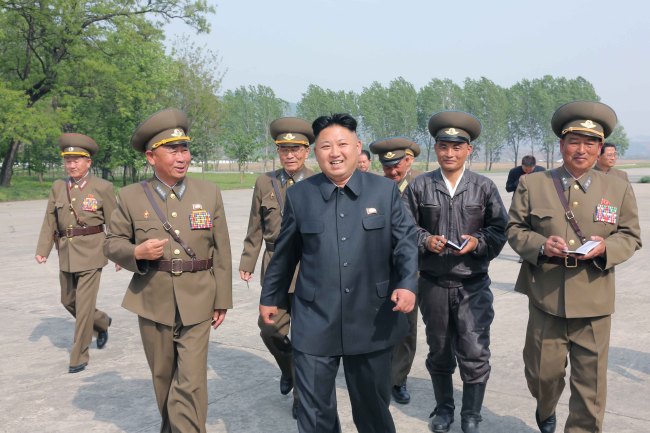Where are relations between China and N. Korea heading?
By Shin Hyon-heePublished : May 19, 2014 - 21:02
With the ties between Seoul and Beijing getting closer, questions have been raised over where the Sino-North Korea relationship is heading.
Observers said that distrust between the communist allies has deepened in recent years due to Pyongyang’s provocative moves including nuclear and missile tests, which has undermined what they traditionally hailed as an alliance “forged in blood.”
Yet, no quintessential change has occurred in their relationship given that the two sides still share critical interests in maintaining their strategic ties, both economically and politically, analysts pointed out.
“Despite the traditional ties, the two countries have not been on good terms due to North Korea’s nuclear test, and there has yet to be any summit between their leaders,” said Koh Yoo-hwan, a professor at Dongguk University in Seoul.
“As China seeks a new type of great-power relationship with the U.S., it has also been pressured to play a responsible role in the international community. In that sense, China has no choice but to let North Korea’s wrongdoings just slip by.”
Amid the palpable estrangement between China and the North, Seoul and Beijing have grown closer, with the former seeking a shift in its foreign policy, which critics argue had focused too much on its alliance with the U.S.
Observers said that distrust between the communist allies has deepened in recent years due to Pyongyang’s provocative moves including nuclear and missile tests, which has undermined what they traditionally hailed as an alliance “forged in blood.”
Yet, no quintessential change has occurred in their relationship given that the two sides still share critical interests in maintaining their strategic ties, both economically and politically, analysts pointed out.
“Despite the traditional ties, the two countries have not been on good terms due to North Korea’s nuclear test, and there has yet to be any summit between their leaders,” said Koh Yoo-hwan, a professor at Dongguk University in Seoul.
“As China seeks a new type of great-power relationship with the U.S., it has also been pressured to play a responsible role in the international community. In that sense, China has no choice but to let North Korea’s wrongdoings just slip by.”
Amid the palpable estrangement between China and the North, Seoul and Beijing have grown closer, with the former seeking a shift in its foreign policy, which critics argue had focused too much on its alliance with the U.S.

In an indication of amicable relations, the leaders of the South and China have so far held bilateral talks four times and are expected to meet again next month. They have also joined forces to prevent North Korean provocations including another nuclear test, sharing the view that Pyongyang’s possession of nuclear arms would threaten regional stability.
Although China’s patience appears to be wearing thin due to the wayward ally’s unpredictable behavior, analysts said that the Sino-North Korea relationship would not undergo any fundamental shift, given that they still highly recognize each other’s strategic value.
They argued that the apparent change in Beijing’s approach to Pyongyang is just a “tactical-level” change to lead the North to behave well.
“China would never abandon North Korea, or would not be thinking of a regime change or anything as it considers stability in the North very crucial,” said Chang Yong-suk, senior analyst at Seoul National University’s Institute for Peace and Unification Studies.
“China, just on a tactical level, is ratcheting up its pressure on North Korea to change its behavior.”
Chang added that as the U.S. is seeking to strengthen security ties with Japan, China will try to maintain stronger relations with the two Koreas.
“(At a time) when the U.S. is trying to maintain strong power in Northeast Asia and Southeast Asia, and raising pressure on China, China might be seeking to embrace North Korea first, and make its relations with South Korea even closer, away from Japan, as part of efforts to weaken the pressure from the U.S.,” he said.
Cheong Seong-chang, a senior fellow at the Sejong Institute, pointed to the increasing economic cooperation between China and the North, saying that despite frayed political relations, their economic partnership remains vital for both.
“For North Korea, China is a crucial trade partner to which it sells its resources. From China’s perspective, the North offers resources at cheap prices,” he said.
“On top of that, China cannot help but think of the development of its northeast region bordering the North, for which its economic partnership with the North is crucial. For transportation of goods eastward, China needs practical cooperation with the North.”
Despite such deep economic ties, Pyongyang has long harbored some resentment toward Beijing, observers said.
In 1992, when China established diplomatic relations with South Korea, the Sino-North Korea relations faltered. The relationship was dealt another blow when China was not willing to help the North when it suffered a devastating famine in the mid-1990s.
Dubbed the “Arduous March,” the famine was caused by the North’s international isolation following the collapse of the Soviet Union in 1991, along with bungled economic policies and flooding.
On top of the North’s aberrant behavior, China is said to have felt unnerved when the North executed Jang Song-thaek, the once-powerful uncle of North Korean leader Kim Jong-un who had served as a crucial conduit for the North’s economic and political cooperation with China.
By Song Sang-ho (sshluck@heraldcorp.com)








![[Graphic News] More Koreans say they plan long-distance trips this year](http://res.heraldm.com/phpwas/restmb_idxmake.php?idx=644&simg=/content/image/2024/04/17/20240417050828_0.gif&u=)
![[KH Explains] Hyundai's full hybrid edge to pay off amid slow transition to pure EVs](http://res.heraldm.com/phpwas/restmb_idxmake.php?idx=644&simg=/content/image/2024/04/18/20240418050645_0.jpg&u=20240419100350)





![[From the Scene] Monks, Buddhists hail return of remains of Buddhas](http://res.heraldm.com/phpwas/restmb_idxmake.php?idx=652&simg=/content/image/2024/04/19/20240419050617_0.jpg&u=20240419175937)

![[KH Explains] Hyundai's full hybrid edge to pay off amid slow transition to pure EVs](http://res.heraldm.com/phpwas/restmb_idxmake.php?idx=652&simg=/content/image/2024/04/18/20240418050645_0.jpg&u=20240419100350)

![[Today’s K-pop] Illit drops debut single remix](http://res.heraldm.com/phpwas/restmb_idxmake.php?idx=642&simg=/content/image/2024/04/19/20240419050612_0.jpg&u=)